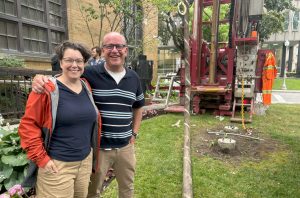Fairy Creek Valley on southeast Vancouver Island has become the site of the largest protest against old-growth logging in the country since the 1990s. Since the protests began a year ago, over 1,000 people have been arrested by the RCMP. Avery Florence Seligman has joined those protesting the plans of logging company Teal Jones and offers this account.
The second question put to me upon arrival at Fairy Creek is: are you arrestable? Some people, for personal or professional reasons, cannot risk it. This question, often asked with a smile, is my initiation into a beautiful world of community, like-minded people joining forces and making the decision to face our environmental crisis head on. But there is also the suffocating reality that arrest is certain and a dissolution of trust in the government elected to represent us and the RCMP hired to protect us. Yes, I’m arrestable.
Of course, the first question is: what’s your name? For fear of police, people adopt Fairy Creek nicknames. If questioned, I couldn’t reveal the identity of the grandmother who cooked and regaled us with accounts of protesting 40 years ago. And back home, I think fondly of people like Elk, having never learned his real name.
Upon entering Fairy Creek “headquarters”, I immediately felt a shift. Though this was my first time being part of a movement this immersive, I felt guided by the community’s open-heartedness and the purpose that we share. Though the specific reasons for coming vary, we all agree: these trees are worth more standing.
Less than three per cent of old-growth trees remain in the temperate rainforest of British Columbia. For over a year, protesters have been camping in a forest on Vancouver Island, protecting irreplaceable ecosystems and watersheds from destruction. Their bodies are the only obstruction between 2,000-year-old trees and forestry company Teal Jones that stated in its licence that it aims to log “until the available old-growth timber has been exhausted.”
In the “outside world” we discuss police violence, archaic and nonsensical government spending and reconciliation with our Indigenous people. By contrast, here in this microcosm of our world, we address these issues concretely: by putting our bodies on the line.
My first evening at Fairy Creek, I sit in a 30-person semicircle for the daily newcomers meeting. As I watch two women lead the meeting, I feel that this is the present-day apocalypse and we are the freedom fighters – because it is and we are.
We’re informed of what’s happening at other camps within Fairy Creek and assigned on a volunteer basis to roles such as night-watch, cooking, building and being on the front-line. I didn’t know what to expect before arriving but I find myself in constant awe of the level of organization. This is not a gathering of “tree-huggers”; this is peaceful warfare.
Initially, my Jewish identity had nothing to do with my pull to Fairy Creek. If anything, I believe that nothing will matter if we don’t have a healthy planet to live in. However, connection with land and respecting our environment are deeply embedded in Jewish heritage. The stirring song and lyrics of “Eli Eli” remind me:
May these things never end:
The sand and the sea
The rustle of the water
The lightning in the sky
The prayer of Man.
Man isn’t separate from nature. Just as the land of Israel is inextricably tied to our identity, so is this land to the Indigenous peoples of Canada.
Robin Wall Kimmerer, the author of Braiding Sweet Grass, writes about undertaking to learn her ancestors’ almost forgotten language with only 10 fluent native speakers left to learn from. She complains to her teacher, “I have no one to speak with.” He replies, “None of us do. But we will.”
Immediately I am reminded of the unfathomable efforts of the Jewish people to breathe new life into ancient Hebrew as a spoken language. Yet another struggle after constant persecution.
When something is at risk of being lost, we realize “impossible’ isn’t an option. Our survival, knowledge and identity are interwoven with our ancestors. Without knowledge passed on by elders, we wouldn’t even know what was lost.
In the presence of a Holocaust survivor, you understand the responsibility of holding their story within you. So too, the ancient Indigenous languages and cultures are irreplaceable. Their language holds knowledge we desperately need to rediscover to respect our earth; just like the wisdom passed down from these ancient trees.
Protesters stand on this land by invitation and under guidance of Elder Bill Jones, a member of the Pacheedaht tribe to which this unceded territory belongs.
I’m about to re-join my community at Fairy Creek. Logging never stopped, even during the fire ban. Police brutality has increased with officers pepper-spraying protesters in the face, pinning unarmed people to the ground and destroying personal property.
I feel privileged to experience the energy and knowledge of those at Fairy Creek. In turn, I feel responsible to share this knowledge with my community. I’m returning to Fairy Creek because I refuse to feel helpless or complicit in the reckless destruction of nature and humanity. It’s personal. We’re one.
Avery Florence Seligman is a singer/songwriter and music teacher living in Toronto.







